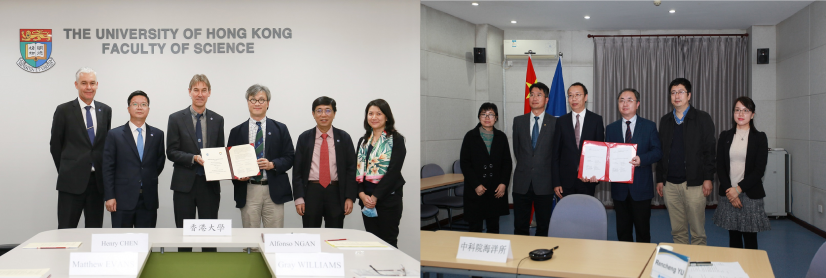HKU partners with Institute of Oceanology, Chinese Academy of Sciences to set up Joint Laboratory of Marine Ecology and Environmental Sciences
With the emerging threats of climate change and human impact on the marine environment, marine ecosystems across the globe are changing rapidly, leading to the urgent need for the conservation and restoration of these key systems. To build a sustainable marine environment, the University of Hong Kong (HKU) joins hands with the Institute of Oceanology of the Chinese Academy of Sciences (IOCAS) to establish the Joint Laboratory of Marine Ecology and Environmental Sciences (JLMEES), fostering collaboration in the fields of marine and environmental sciences between Hong Kong and Mainland China. The two institutes signed the Memorandum of Understanding (MoU) on November 24, 2020.
This initiative aimed at establishing a strategic platform for interdisciplinary collaboration between IOCAS and HKU, through the Swire Institute of Marine Science (SWIMS) under the Faculty of Science, to facilitate innovative scientific research, promote academic exchange and develop personnel training in the marine science arena. The research directions of this joint laboratory involve, but are not limited to, (1) marine biodiversity and global change, (2) marine biogeochemistry and environmental change, (3) marine ecosystems and ecological disasters, and (4) marine resources and ecological restoration.
Professor Fan WANG, Director of IOCAS, is delighted to see the strengthening collaboration between IOCAS and SWIMS. “This marks a substantial step forward in the cooperation between IOCAS and HKU. The cooperation meets the country’s urgent need for marine development and represents an opportunity for a new round of development. The two sides will carry out innovative and interdisciplinary cooperative research in marine ecology and environmental sciences to jointly serve Hong Kong and the Greater Bay Area,” said Professor Wang.
Dr CHEN Heng, Director of the Department of Educational, Scientific and Technological Affairs of the Liaison Office of the Central People’s Government in the HKSAR (LOCPG), envisioned the collaboration would bring mutual benefits to the research developments of both institutes. “These two key marine research academic centres come from the north and the south. Collaboration between the two is a critical event in marine sciences, where we can achieve more together through cooperation and resource sharing. As President Xi Jinping always stresses, we need to show greater care about the ocean, understand more about it and make strategic plans for the use of it. The LOCPG is willing to assist and hope that the two parties can continue to work and succeed in the cooperation,” said Dr Chen.
Professor Alfonso NGAN, Acting Vice-President and Pro-Chancellor (Research), Kingboard Professor in Materials Engineering and Chair Professor in Materials Science and Engineering at the Department of Mechanical Engineering of the Faculty of Engineering of HKU, believed that the collaboration could strengthen the leadership position of HKU in this area. “I am very pleased to witness this momentous occasion in establishing closer ties between HKU and CAS to spearhead advanced research in marine ecology and environmental sciences. This collaboration is both well-timed and meaningful. I am confident that this research partnership will drive a new wave of world-class developments in marine sciences and be further advanced with the interdisciplinary research culture in both institutions, raising the research collaboration to new heights,” said Professor Ngan.
Professor Matthew EVANS, Dean of HKU Science, regarded the collaborative initiative as a milestone in the development of SWIMS. He said: “This is a significant moment for marine ecology and environmental science in the Faculty. Only the strongest research areas get approval to launch a joint laboratory with CAS. The Faculty has recognised for some time that the interdisciplinary work conducted by the Swire Institute of Marine Science is one of our research strengths. I am extremely pleased to see this recognised by the collaboration with the Institute of Oceanology in Qingdao. We are particularly proud as it has been ten years since the formation of the last joint laboratory between CAS and HKU.”

